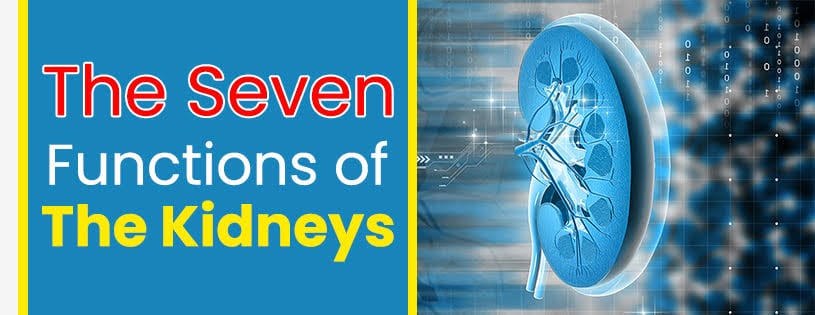What are the 7 functions of the kidney?
The fundamental function of the kidneys, as most people know, is to eliminate waste items from the body by washing them out with urine. However, did you know that your kidneys are also responsible for at least six more fantastic functions? The nephrologist from all over the world loves to educate patients about kidney disease so that they can. To assist patients understand how the kidneys work, here’s a brief summary of their seven basic tasks.
Basic functions of the kidneys:
The basic 7 functions of kidney includes ACID balance, Electrolyte and Water balance, Toxins removal, Controlling BP, Produce hormones and activates Vitamin D. Let’s go into detail one by one, so that we will understand what are the functions of kidney are? And how it works, take a brief look at each of these functions –
Keep the balance of acid and base in the body –
The acids and bases in the human body are always in a delicate balance, which is indicated by the pH value. The pH of the blood should be lie in between 7.35 and 7.45 range. When the body has too many acids or bases, the kidneys discharge them; when there isn’t enough, the kidneys store them.
Controlling the flow of water –
One of the main methods for the body to maintain and operate a healthy water balance is done through the kidneys. The kidneys monitor the amount of urine produced in response to one’s hydration level. When you consume a lot of water, your kidneys generate more urine, and when you’re dehydrated, the opposite happens.
Electrolyte equilibrium is maintained by kidneys –
The kidneys filter certain electrolytes from the blood, recirculate some of them, and eliminate excess electrolytes in the urine. The health of one’s kidneys has a big impact on electrolyte levels like salt and phosphate.
The body is cleansed of toxins and waste products –
Water-soluble waste materials and other toxins are filtered out of the body through the kidneys, which are then flushed and moved away through urine. That’s why, when the body’s waste products build up and hamper its activities, renal failure quickly leads to acute intoxication.
Keeping blood pressure in check –
Renin is an enzyme produced by the kidneys. Renin turns angiotensinogen, which is produced in the liver, into angiotensin I, which is then transformed into angiotensin II in the lungs. Angiotensin II causes blood arteries to contract, raising blood pressure. When one’s blood pressure is excessively high, on the other hand, the kidneys generate more urine in order to lessen the amount of liquid circulating in the body and somewhat compensate for the high blood pressure.
Erythropoietin production by kidneys –
Erythropoietin is a hormone produced by the kidneys. This hormone’s primary purpose is to assist the body in producing more red blood cells (erythrocytes), which are necessary for the delivery of oxygen throughout all tissues and organs.
Vitamin D activation –
Calcifediol is converted to calcitriol, the active form of vitamin D, in the kidneys. Calcitriol is a hormone that circulates in the bloodstream and regulates the calcium and phosphate balance in the body, which is necessary for proper bone formation.
As you can see, the kidneys are a remarkable pair of organs with a role in your health that extends far beyond waste elimination. If you or someone you care about notices a change in any of the above functions, don’t hesitate to contact a kidney specialist for Ayurvedic treatment or any other treatment and have a thorough discussion.

